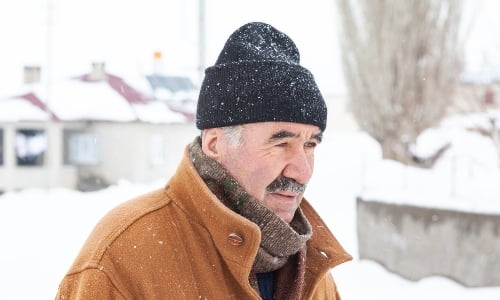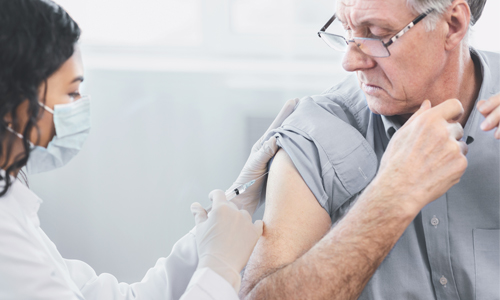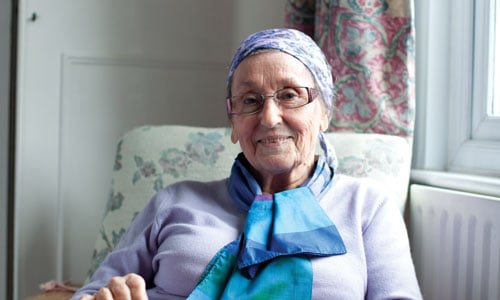Winter can be an extremely difficult time for older people and the health and care professionals who support them.
An already stretched health and care system is often pushed to its limits, and older people make up a large proportion of those who feel the impact.
Age UK’s latest research found that:
- Nearly 8 million older people in the UK were concerned about the upcoming winter.
- 40% of older people are worried they won't be able to heat their home enough.
- 58% of older people are worried that the NHS won't be able to cope.
- 18% of older people are worried about not being able to eat enough.
We’ve answered the most common questions about staying well in winter, so that we can all better navigate the upcoming colder months and look after each other.
What challenges do older people face in winter?
For older people, winter can present significant difficulties. The likelihood of living with one or more long term health conditions rises with age, and some conditions can become harder to manage as the weather gets colder.
Older people are more susceptible to the severe impacts of common respiratory diseases such as the flu, coronavirus, and respiratory syncytial virus (RSV), and make up a large proportion of those who need hospital treatment and care. And it’s not just the respiratory system that’s at risk – as we get older, loss of muscle mass and other age-related physical changes mean our bodies are less able to regulate temperature. This can make us more likely to be affected by chronic or extreme cold, increasing the risk of heart attacks and strokes.
Whether due to these health impacts or seasonal changes in lifestyle, many older people are also less inclined to be physically active during the winter months. This decrease in activity can lead to physical deconditioning and can also impact mobility, strength, and balance. And for those who do get out of the house, wet or icy weather can make outdoor conditions more precarious for anyone less steady on their feet.
Winter can present plenty of mental health challenges, too. Loneliness and social isolation are year-round problems, but winter can be particularly tough as weather conditions, shorter days, and changes in people’s health and wellbeing often make it harder to sustain social connections. This all means that older people are more likely to spend additional time at home over winter, which has implications for heating costs and finding the finances to stay warm.
We have free resources available
Our website has a selection of resources that can be used help someone stay well this winter.
What if someone’s worried they can’t afford to eat or stay warm this winter?
Many older people will be concerned about paying their bills this winter, but it’s important that saving money doesn’t come at the cost of health.
Eating a balanced, healthy diet throughout winter can keep us feeling well. Batch-cooking food and choosing frozen over fresh are just two of the ways to keep costs down, and to stay healthy on a budget.
Age UK is also here to help older people get the financial support they’re entitled to – like the Winter Fuel Payment.
Designed to help with pensioners cover the costs of heating bills during the colder months, the Winter Fuel Payment has been through some recent changes. As it currently stands, all households in England and Wales that include someone who has reached State Pension age will automatically receive a Winter Fuel Payment of £200 or £300 this winter.
How important are vaccines?
Getting an infectious disease like the flu, coronavirus, shingles or pneumonia can have a severe impact on older people, so having a vaccination for these nasty diseases is an easy and effective way to stay well. As we age our body becomes less able to fight off infections, so vaccines provide a way to support our bodies to do this more effectively.
Who’s eligible for the coronavirus vaccine?
Changes to the eligibility criteria for the coronavirus vaccine are already causing uncertainty this winter. We’ve heard from older people that some have been turned away from their vaccination appointments because they were ineligible. It’s therefore a good idea for those who are considering vaccinations to check the criteria before booking.
We have an Information and Advice page on vaccines which lists who can currently access vaccinations for flu, coronavirus and more. The NHS website also has up-to-date guidance on vaccine eligibility.
How can we help dispel the misinformation about vaccinations?
There’s lots of misinformation out there around vaccines, so it’s vital for older people to get information from trusted sources which are backed by science and evidence. Places like the World Health Organisation or the NHS website are good places to start, but health professionals play an important role too.
Here are some useful facts to share about vaccines and the vaccination process:
- All vaccines available on the NHS have been rigorously tested for their safety and continue to be monitored after they’ve been introduced to ensure they still work and do not lead to any new side effects.
- It is safe to have more than one vaccine administered at the same time.
- If you had the flu vaccination last year, you still need to be vaccinated this year. Flu can change from one winter to the next and vaccines are updated each winter to give protection against the strains of flu that are most likely to be circulating.
- The Government decide who is eligible for vaccination based on advice from the Joint Committee on Vaccination and Immunisation (JCVI), an independent advisory committee. It is the JCVI's responsibility to weigh up all factors when making recommendations on eligibility for vaccines based on scientific and evidenced based research.
What else can be done to help older people in the winter months?
Supporting older people, families and communities to take simple steps this winter can help us all stay well, and can significantly reduce the risk of physical deconditioning, seasonal infections, and common health problems emerging or escalating over the winter months.
Equipping older people with the right information to help keep warm, eat well, get vaccinated, stay active and connected can all make a huge difference – as can a place to turn for a little extra help and support before a problem escalates into a crisis.






